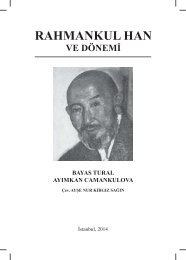THE SOVIET HISTORIOGRAPHY AND THE QUESTION OF KAZAKHSTAN’S HISTORY
SOVYET-TARIH-YAZICILIGI-ENG
SOVYET-TARIH-YAZICILIGI-ENG
Create successful ePaper yourself
Turn your PDF publications into a flip-book with our unique Google optimized e-Paper software.
212<br />
<strong>THE</strong> <strong>SOVIET</strong> <strong>HISTORIOGRAPHY</strong> <strong>AND</strong><br />
murdered or arrested during the Stalin-period, even after the dissolution<br />
of the Soviet Union. Therefore, the life stories of the intellectuals who<br />
were either murdered or arrested during the Stalin-period are written<br />
sans detail. 401 It was not likely for the intellectuals to complete their<br />
works or articles and embroider them with images, letters, and other<br />
official documents. Only after 1991 did some images and letters began<br />
to reappear from the drawers, from under mattresses, and pits in the<br />
backyards. Honestly, these items typically drew little attention from<br />
anybody except family members.<br />
The returnees from the labour camps could mention only little<br />
about the violence and torture they suffered in the camps. To recall<br />
the bad memories or to speak negative words about the Soviet authorities<br />
would lead to extra punishments. Thus, the best way was to<br />
maintain silence and keep a record of the memories in the brain. 402<br />
In subsequent years, victims and survivors of the camps were<br />
suspect because of their very survival. For example, one of the most<br />
prominent Bashkir-Tatar intellectuals, Seyfi Kudaş was frequently accused<br />
being a survivor. The survival in the camps was strictly related to<br />
the self-survival and generally juxtaposed against another’s downfall.<br />
Since most of the documents of intellectuals arrested or murdered<br />
during this period are kept in the archives of the Russian Federation<br />
Intelligence Agency (formerly KGB, now FSB), and only former USSR<br />
countries’ scholars are allowed to research in these archives, to<br />
utilize these documents is impossible. 403 Non-USSR scholars have<br />
to rely on the research of USSR scholars. However, it is extremely<br />
difficult to attain a research permit even in ordinary state archives<br />
in Azerbaijan, Kazakhstan, Kyrgyzstan, Turkmenistan, Uzbekistan, and<br />
Tajikistan; that is, even dreaming of a research permit about these<br />
401 For example, Tatar author Muhammet Gaynullin, in Tatar Edipleri (Kazan 1978), mentioned<br />
some of the authors killed in Stalin-period in the years 1937-1938; however, he included<br />
no data on their later years or their fates. He could only include their date of death.<br />
Muhammet Gaynullin undoubtedly wanted to write the truth down; however, it was not the<br />
right time. Selam Alişev who edited Turkish World’s first historian with diploma Aziz Ubeydullin’s<br />
works wrote the unjust arrest and death of Aziz Ubeydullin in (Tarihi Sahifeler Açılganda,<br />
Kazan 1989)’s introduction; however, he failed to provide information on the details of the calamity.<br />
We do not know whether he did so because of the lack of available data or because<br />
of fear.<br />
402 For the stories of camp-survivors, see: Figes, Orlando, Karanlıkta Fısıldaşanlar (Trans.<br />
Nurettin Elhüseyni), İstanbul 2011.<br />
403 Aşnin, F. D., Alpatov V. M. and Nasilov D. M. “Who Worked in the Intelligence Archives<br />
of the Russian Federation, Azerbaijan, Kazakhstan and Kyrgyzstan”, Repressirovannaya<br />
Tyurkologiya, Moscow 2002. Attaining research permit from the aforementioned countries’<br />
intelligence archives should have made other researchers envious.



